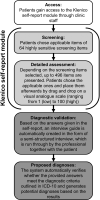Preliminary validation of the Klenico diagnostic software self-report module through comparison with the diagnostic gold standard in an outpatient routine clinical sample
- PMID: 37663014
- PMCID: PMC10469457
- DOI: 10.1080/21642850.2023.2244576
Preliminary validation of the Klenico diagnostic software self-report module through comparison with the diagnostic gold standard in an outpatient routine clinical sample
Abstract
Background: Inaccuracy in current diagnostic procedures for mental disorders can lead to misdiagnosis and increase the burden on the healthcare system. Therefore, Klenico, a diagnostic software designed to support comprehensive and efficient clinical diagnostic procedures that is easy to apply in everyday clinical practice, was developed. This study aimed to take the first step toward validating the Klenico self-report module.
Methods: Data of 115 patients from a German psychotherapeutic outpatient clinic were included in this study. Criterion validity was tested by comparing Klenico with the diagnoses based on the structured clinical interview for DSM-IV (SCID). Construct validity was investigated by comparing Klenico with commonly used self-reporting questionnaires.
Results: The results showed that most of the Klenico disorder domains were able to differentiate between corresponding diagnoses and other diagnoses, confirming criterion validity. Construct validity was demonstrated by high correlations with the compared convergent questionnaire scales and non-significant or low correlations with most of the divergent scales.
Conclusions: These preliminary results demonstrate the psychometric properties of the Klenico self-report module and imply that the Klenico system has high potential to improve the accuracy of diagnostic procedures in everyday clinical practice.
Keywords: Klenico; clinical assessment; gold standard; mental disorders; validation.
© 2023 The Author(s). Published by Informa UK Limited, trading as Taylor & Francis Group.
Conflict of interest statement
In accordance with Taylor & Francis policy and our ethical obligation as researchers, we are reporting that M. Augsburger, D. Milanovic and S. Reutimann are employed by the Klenico Health AG. M.D. Gulewitsch has no potential competing interest to report.
Figures
Similar articles
-
Assessing validity of the Klenico diagnostic software system in a large psychotherapeutic inpatient sample.Front Digit Health. 2023 Aug 24;5:1176130. doi: 10.3389/fdgth.2023.1176130. eCollection 2023. Front Digit Health. 2023. PMID: 37720163 Free PMC article.
-
[Preliminary comparative study of the personality disorder evaluation DIP instrument with the semi-structured SCID-II interview].Encephale. 2009 Dec;35(6):544-53. doi: 10.1016/j.encep.2008.09.007. Encephale. 2009. PMID: 20004285 French.
-
[Diagnostic structured interviews in child and adolescent's psychiatry].Encephale. 2004 Mar-Apr;30(2):122-34. doi: 10.1016/s0013-7006(04)95422-x. Encephale. 2004. PMID: 15107714 Review. French.
-
Rapid and Accurate Behavioral Health Diagnostic Screening: Initial Validation Study of a Web-Based, Self-Report Tool (the SAGE-SR).J Med Internet Res. 2018 Mar 23;20(3):e108. doi: 10.2196/jmir.9428. J Med Internet Res. 2018. PMID: 29572204 Free PMC article.
-
Validity of current somatoform disorder diagnoses: perspectives for classification in DSM-V and ICD-11.Psychopathology. 2008;41(1):4-9. doi: 10.1159/000109949. Epub 2007 Oct 18. Psychopathology. 2008. PMID: 17952015 Review.
Cited by
-
Evaluating the Construct Validity and Sensitivity to Change of the Klenico Depression Domain in Psychotherapeutic Inpatient Care: Instrument Validation Study.JMIR Form Res. 2025 Jul 24;9:e50504. doi: 10.2196/50504. JMIR Form Res. 2025. PMID: 40706024 Free PMC article.
References
-
- Beck, A. T., Steer, R. A., & Brown, G. K. (1996). Beck depression inventory (BDI-II) (Bd. 10). Pearson London.
-
- Bolbeth, A., Ziegler, M., & Fehm, L. (2021). Störungsübergreifende Fragebogendiagnostik in der Psychotherapie: Ein Vergleich des Brief Symptom Inventorys und des ICD-10 Symptom Rating. PPmP - Psychotherapie · Psychosomatik · Medizinische Psychologie, 71(05), 202–208. 10.1055/a-1264-0348 - DOI - PubMed
LinkOut - more resources
Full Text Sources

